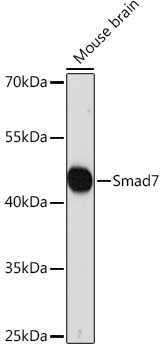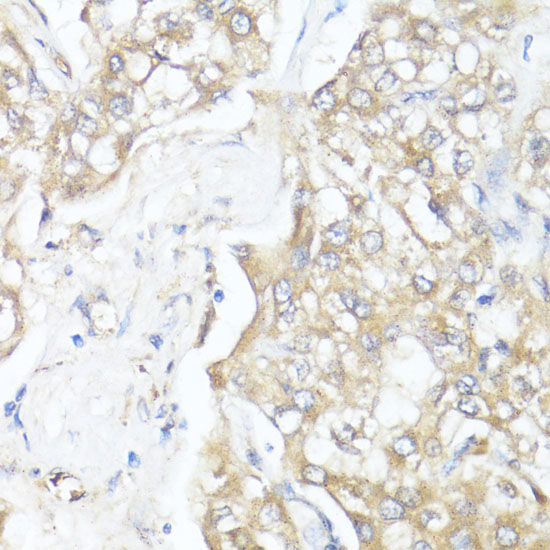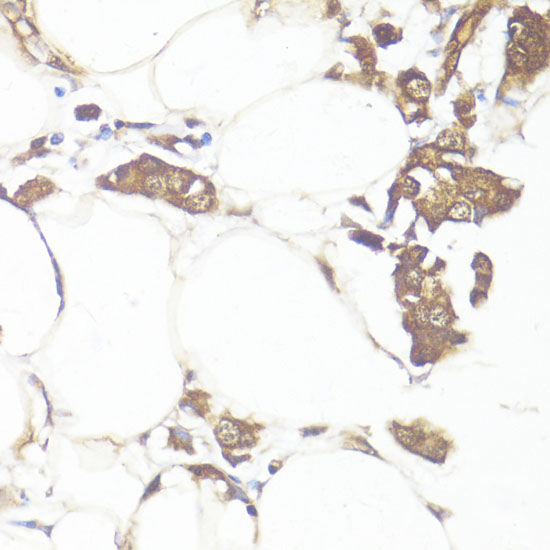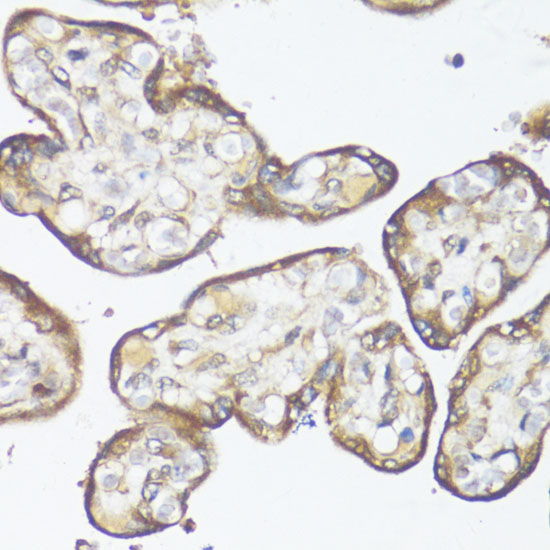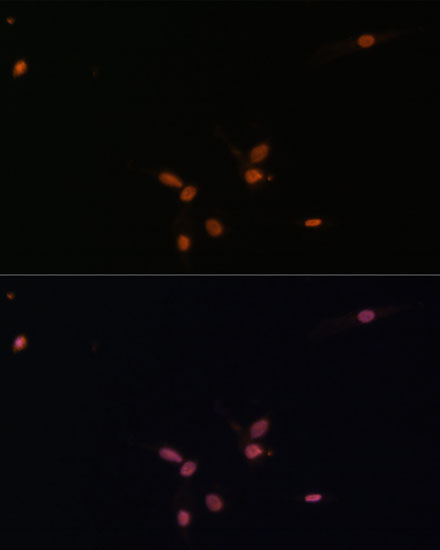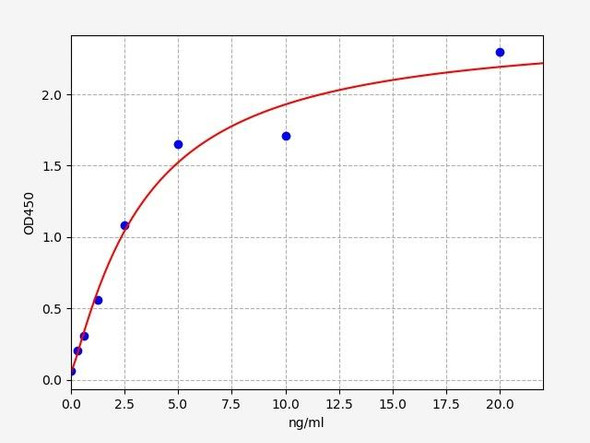Anti-Smad7 Antibody (CAB16396)
- SKU:
- CAB16396
- Product type:
- Antibody
- Reactivity:
- Human
- Mouse
- Rat
- Host Species:
- Rabbit
- Isotype:
- IgG
- Antibody Type:
- Polyclonal Antibody
- Research Area:
- Epigenetics and Nuclear Signaling
Description
| Antibody Name: | Anti-Smad7 Antibody |
| Antibody SKU: | CAB16396 |
| Antibody Size: | 20uL, 50uL, 100uL |
| Application: | WB IHC IF |
| Reactivity: | Human, Mouse, Rat |
| Host Species: | Rabbit |
| Immunogen: | A synthetic peptide corresponding to a sequence within amino acids 1-100 of human Smad7 (NP_005895.1). |
| Application: | WB IHC IF |
| Recommended Dilution: | WB 1:500 - 1:2000 IHC 1:50 - 1:200 IF 1:50 - 1:200 |
| Reactivity: | Human, Mouse, Rat |
| Positive Samples: | Mouse brain |
| Immunogen: | A synthetic peptide corresponding to a sequence within amino acids 1-100 of human Smad7 (NP_005895.1). |
| Purification Method: | Affinity purification |
| Storage Buffer: | Store at -20°C. Avoid freeze / thaw cycles. Buffer: PBS with 0.02% sodium azide, 50% glycerol, pH7.3. |
| Isotype: | IgG |
| Sequence: | MFRT KRSA LVRR LWRS RAPG GEDE EEGA GGGG GGGE LRGE GATD SRAH GAGG GGPG RAGC CLGK AVRG AKGH HHPH PPAA GAGA AGGA EADL KALT HSVL |
| Gene ID: | 4092 |
| Uniprot: | O15105 |
| Cellular Location: | Cytoplasm, Nucleus |
| Calculated MW: | 23kDa/46kDa |
| Observed MW: | 46kDa |
| Synonyms: | SMAD7, CRCS3, MADH7, MADH8 |
| Background: | The protein encoded by this gene is a nuclear protein that binds the E3 ubiquitin ligase SMURF2. Upon binding, this complex translocates to the cytoplasm, where it interacts with TGF-beta receptor type-1 (TGFBR1), leading to the degradation of both the encoded protein and TGFBR1. Expression of this gene is induced by TGFBR1. Variations in this gene are a cause of susceptibility to colorectal cancer type 3 (CRCS3). Several transcript variants encoding different isoforms have been found for this gene. |
| UniProt Protein Function: | SMAD7: Antagonist of signaling by TGF-beta (transforming growth factor) type 1 receptor superfamily members; has been shown to inhibit TGF-beta (Transforming growth factor) and activin signaling by associating with their receptors thus preventing SMAD2 access. Functions as an adapter to recruit SMURF2 to the TGF-beta receptor complex. Also acts by recruiting the PPP1R15A- PP1 complex to TGFBR1, which promotes its dephosphorylation. Positively regulates PDPK1 kinase activity by stimulating its dissociation from the 14-3-3 protein YWHAQ which acts as a negative regulator. Genetic variations in SMAD7 influence susceptibility to colorectal cancer type 3 (CRCS3). Colorectal cancer consists of tumors or cancer of either the colon or rectum or both. Cancers of the large intestine are the second most common form of cancer found in males and females. Symptoms include rectal bleeding, occult blood in stools, bowel obstruction and weight loss. Treatment is based largely on the extent of cancer penetration into the intestinal wall. Surgical cures are possible if the malignancy is confined to the intestine. Risk can be reduced when following a diet which is low in fat and high in fiber. Belongs to the dwarfin/SMAD family. |
| UniProt Protein Details: | Protein type:Transcription factor; DNA-binding Chromosomal Location of Human Ortholog: 18q21.1 Cellular Component: nucleoplasm; transcription factor complex; protein complex; cell-cell adherens junction; cytoplasm; plasma membrane; catenin complex; cytosol; nucleus Molecular Function:collagen binding; protein binding; metal ion binding; ubiquitin protein ligase binding; beta-catenin binding; activin binding; transforming growth factor beta receptor, inhibitory cytoplasmic mediator activity; transcription factor activity Biological Process: transcription initiation from RNA polymerase II promoter; protein stabilization; transcription, DNA-dependent; negative regulation of transcription factor activity; negative regulation of peptidyl-serine phosphorylation; negative regulation of transcription from RNA polymerase II promoter; regulation of activin receptor signaling pathway; negative regulation of BMP signaling pathway; BMP signaling pathway; regulation of transforming growth factor beta receptor signaling pathway; ureteric bud development; positive regulation of protein ubiquitination; positive regulation of proteasomal ubiquitin-dependent protein catabolic process; transforming growth factor beta receptor signaling pathway; positive regulation of cell-cell adhesion; negative regulation of ubiquitin-protein ligase activity; artery morphogenesis; ventricular cardiac muscle morphogenesis; positive regulation of transcription from RNA polymerase II promoter; negative regulation of protein ubiquitination; gene expression; negative regulation of transforming growth factor beta receptor signaling pathway; negative regulation of cell migration Disease: Colorectal Cancer, Susceptibility To, 3 |
| NCBI Summary: | The protein encoded by this gene is a nuclear protein that binds the E3 ubiquitin ligase SMURF2. Upon binding, this complex translocates to the cytoplasm, where it interacts with TGF-beta receptor type-1 (TGFBR1), leading to the degradation of both the encoded protein and TGFBR1. Expression of this gene is induced by TGFBR1. Variations in this gene are a cause of susceptibility to colorectal cancer type 3 (CRCS3). Several transcript variants encoding different isoforms have been found for this gene. [provided by RefSeq] |
| UniProt Code: | O15105 |
| NCBI GenInfo Identifier: | 18418630 |
| NCBI Gene ID: | 4092 |
| NCBI Accession: | |
| UniProt Secondary Accession: | O15105,O14740, Q6DK23, |
| UniProt Related Accession: | O15105 |
| Molecular Weight: | 46,426 Da |
| NCBI Full Name: | Smad7 |
| NCBI Synonym Full Names: | SMAD family member 7 |
| NCBI Official Symbol: | SMAD7 |
| NCBI Official Synonym Symbols: | CRCS3; MADH7; MADH8; FLJ16482 |
| NCBI Protein Information: | mothers against decapentaplegic homolog 7; hSMAD7; MAD homolog 8; OTTHUMP00000163490; mothers against DPP homolog 8; SMAD, mothers against DPP homolog 7; Mothers against decapentaplegic, drosophila, homolog of, 7; MAD (mothers against decapentaplegic, Drosophila) homolog 7 |
| UniProt Protein Name: | Mothers against decapentaplegic homolog 7 |
| UniProt Synonym Protein Names: | Mothers against decapentaplegic homolog 8; MAD homolog 8; Mothers against DPP homolog 8; SMAD family member 7 |
| Protein Family: | Mothers against decapentaplegic |
| UniProt Gene Name: | SMAD7 |
| UniProt Entry Name: | SMAD7_HUMAN |


